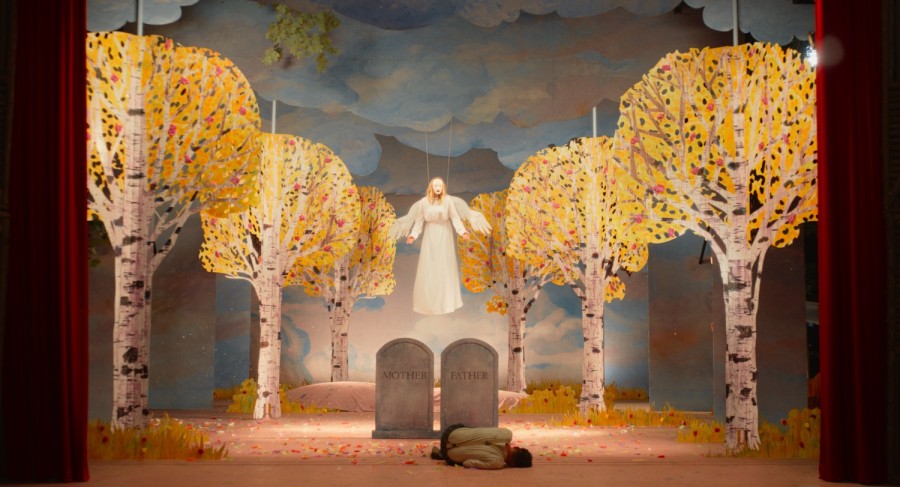Review: ‘Beau Is Afraid’ is only occasionally frightening
Ari Aster’s new film is a big departure from his previous horror films, as he ventures into a long odyssey of surrealist comedy.
April 25, 2023
“Beau Is Afraid,” and there’s no doubt about it. What exactly Beau is afraid of, though, is a question that director Ari Aster seems less interested in answering than he should be. His last two films were acclaimed for being frightening, but also upfront with their themes — “Hereditary” is a story about generational trauma and “Midsommar” is about a woman finding the support she lacked from her boyfriend in a cult. “Beau” strives to be about the fear a son feels toward his mother — that theme, unfortunately, is forgotten about for the majority of the film’s runtime.
To say that this film is long, messy and often nonsensical is not necessarily a criticism. For some people, it’s a part of its appeal. In my case, however, the second act became a slog to get through once it veered away from the relatable anxieties presented in the first act, only returning to them at the very end.
“Beau Is Afraid” is about Beau, a schlubby middle-aged man played by Joaquin Phoenix. It’s not clear what he does for a living, or even what he does with most of his day. The film opens with him in a therapy session explaining symptoms pretty common to anyone with anxiety or obsessive-compulsive disorder. But the main source of Beau’s angst stems from his complex relationship with his mother (Patti LuPone), a woman with a talent for guilt-tripping her son and keeping him dutiful and compliant to her, despite him being well into his 40s.
When Beau steps outside into the ridiculously dark fantasy version of a modern city he lives in, the movie is at its funniest. We see the world not really as it is, but how Beau sees it. He lives in a world where every worst fear is reality: the police will shoot you for just standing in front of them, people can buy an AK-47 at a stand on the sidewalk, and crime is so rampant that he has to sprint to his front door every day to escape a horde of homeless people wandering through the streets like zombies.
Beau returns to his apartment after therapy to prepare to visit his mother to celebrate the anniversary of his father’s death with her. He is scheduled to take a flight to her the next morning, but misses it after someone snatches his keys and luggage. He calls his mother to tell her that he doesn’t think he can make it, but will do anything to make it right. She is masterful in her ability to turn his predicament into an example of Beau’s selfishness and her own victimhood, shutting down his protestations with a passive-aggressive “I’m sure you will do the right thing.”
Beau’s quest to prove his mother wrong seems like it will be the centerpiece of the film, but, surprisingly, it takes until the very end. Beau is on an odyssey to make it to his mother, but he just cannot catch a break. After he is hit by a car, he is trapped and bedridden in the house of a married couple who are grieving the loss of their son, a soldier killed in battle in Caracas — in this alternate reality, the United States has invaded Venezuela.
It fits with Beau’s character that his central obstacle here is trying to avoid being rude to the family that is caring for him, but these scenes are not as funny as the previous ones. There are small hints to the grieving couple’s problems, but these are too shallow or obtuse to really be tragic or comic. Their sadness at the loss of their son and the possibility of finding a replacement in Beau could have been explored more. What does Beau think about finally being in a loving household with doting parents? It could have been a great opportunity to either mock or sympathize with the characters’ desperate attempts to find what they either lost or never had in their families. The couple, played by Nathan Lane and Amy Ryan, don’t get much of a characterization outside of just being blandly nice.
But this situation is left behind much too quickly for reasons that are hard to understand or explain. After this, Beau is seemingly just pushed from place to place, doing nothing to change his situation in a long series of meandering sequences. Maybe the strangeness is fun for some, but I found the surrealism especially boring, since it’s not rooted in a character. For a better example of a surrealist drama-comedy that accomplishes this feat, check out Charlie Kaufman’s “Synecdoche, New York.”
Go along for the ride if you want, but the real potential of the movie comes back in its final half hour. At this point, Beau finds a lover and finally confronts his issues with his mother. The jokes are once again all about Beau and his neuroses, and LuPone is fantastic as his guilt-tripping mother. She is so good, in fact, that it just becomes a shame there wasn’t more of her in the film.
The big ending set piece is as on the nose as it can possibly be, but it feels like, once again, we have entered the mind of Beau, which, honestly, was a welcome reprieve after the previous hour of meandering in the woods with him.
“Beau Is Afraid” is currently showing at select theaters in New York City.
Contact Justin Martinez at [email protected].
























































































































































